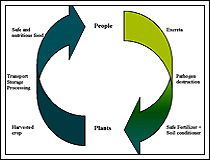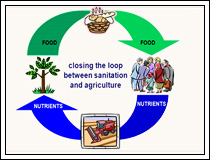Concept of Ecological Sanitation

What is Ecological Sanitation?
Ecological Sanitation or Ecosan is a sanitation technology based on which valuable nutrients from waste products like urine and faeces instead of being disposed off are returned back to the environment. Thus, as opposed to conventional disposal oriented sanitation solutions like sewer-based (flush-and-forget) or pit-based (drop-and-store) sanitation systems, the concept of Ecosan minimizes environmental degradation as well as reduces health hazards associated with sanitation, contaminated water and harmful waste products. As nutrients and organic materials present in waste products are reused in diverse irrigation activities through the Ecosan system, it also greatly contributes to agricultural productivity with minimum use of valuable water resources.
Main Objectives of Ecosan
Ecological sanitation or Ecosan systems are implemented to attain the following primary objectives:
- Reducing diseases
- Promoting health
- Protecting the environmental resources
- Conserving water resources.
- Benefits of Ecosan Systems
 Sustainable re-use and recycling of nutrients from human excreta such as faeces and urine through ecosan systems mainly has the following basic advantages to offer: Sustainable re-use and recycling of nutrients from human excreta such as faeces and urine through ecosan systems mainly has the following basic advantages to offer:
- It allows for safe and hygienic recovery and re-use of nutrients, organics, and other trace elements present in the so-called waste products
- It brings improvement in health by minimizing entry of harmful pathogens from human waste products into the water cycle
- It preserves and promotes the fertility of the soil
- It conserves water resources, whilst minimizing water pollution
- It enhances agricultural productivity and output
- It allows for adoption of appropriate cost-efficient sanitary solutions as per the prevalent local situation.
|